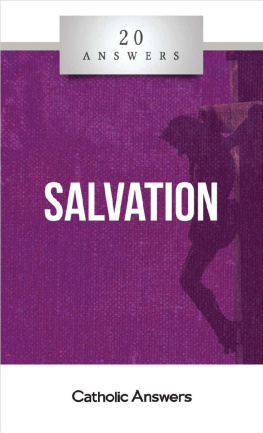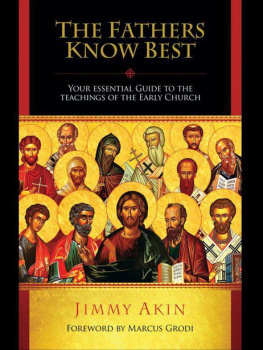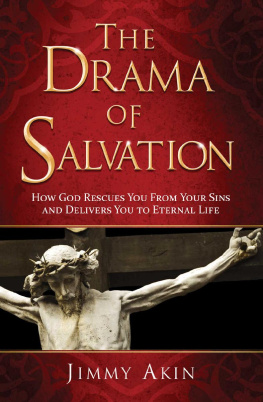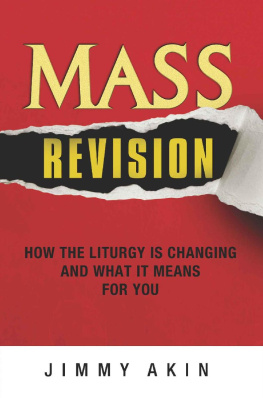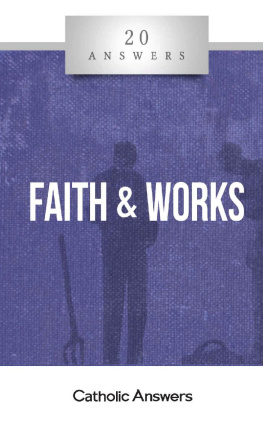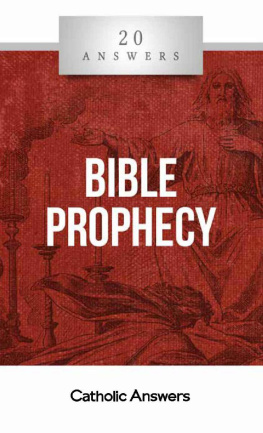Jimmy Akin - 20 Answers- Salvation
Here you can read online Jimmy Akin - 20 Answers- Salvation full text of the book (entire story) in english for free. Download pdf and epub, get meaning, cover and reviews about this ebook. year: 2016, publisher: Catholic Answers Press, genre: Religion. Description of the work, (preface) as well as reviews are available. Best literature library LitArk.com created for fans of good reading and offers a wide selection of genres:
Romance novel
Science fiction
Adventure
Detective
Science
History
Home and family
Prose
Art
Politics
Computer
Non-fiction
Religion
Business
Children
Humor
Choose a favorite category and find really read worthwhile books. Enjoy immersion in the world of imagination, feel the emotions of the characters or learn something new for yourself, make an fascinating discovery.
- Book:20 Answers- Salvation
- Author:
- Publisher:Catholic Answers Press
- Genre:
- Year:2016
- Rating:3 / 5
- Favourites:Add to favourites
- Your mark:
- 60
- 1
- 2
- 3
- 4
- 5
20 Answers- Salvation: summary, description and annotation
We offer to read an annotation, description, summary or preface (depends on what the author of the book "20 Answers- Salvation" wrote himself). If you haven't found the necessary information about the book — write in the comments, we will try to find it.
20 Answers- Salvation — read online for free the complete book (whole text) full work
Below is the text of the book, divided by pages. System saving the place of the last page read, allows you to conveniently read the book "20 Answers- Salvation" online for free, without having to search again every time where you left off. Put a bookmark, and you can go to the page where you finished reading at any time.
Font size:
Interval:
Bookmark:
20 Answers
Salvation
Jimmy Akin

20 Answers: Salvation
Jimmy Akin
2015 Catholic Answers
All rights reserved. Except for quotations, no part of this book may be reproduced or transmitted in any form or by any means, electronic or mechanical, including photocopying, recording, uploading to the Internet, or by any information storage and retrieval system, without written permission from the publisher.
Published by Catholic Answers, Inc.
2020 Gillespie Way
El Cajon, California 92020
1-888-291-8000 orders
619-387-0042 fax
catholic.com
Printed in the United States of America
978-1-941663-61-5
978-1-941663-62-2 Kindle
978-1-941663-63-9 ePub
Table of Contents
Introduction
The message of salvation is at the center of the Christian faith. It is proclaimed throughout Scripture, and a summary of it is found in one of the most famous verses of the Bible: For God so loved the world that he gave his only Son, that whoever believes in him should not perish but have eternal life (John 3:16). In a remarkably short space, this verse covers key themes connected with the message of salvation.
The first of these themes is Gods love for mankind. This is at the root of our salvation. God loves us, and how much he loves us is indicated by the second theme.
When Scripture says that God gave his only Son, it refers to Jesus Christ and the key events of his lifeparticularly his death on the cross. God didnt just give his Son to be born among menhe gave him to die on a cross for our salvation. Thats how much God loves us!
God does not force his gift of salvation upon us, however. We may choose to accept itor not. Thus, a third theme in the verse refers to our response to Gods initiative: if we place our faith in Jesus Christ, then we can receive the benefits that, in love, God wants to give us.
Chief among these benefits is that we will not perish but have eternal life. This points to our eternal destiny beyond this life: we could perish in the sense of being eternally separated from God or we could have eternal life by being united with him forever in heaven.
The verse thus proceeds through several stages, from Gods love for mankind to his giving his only Son, to our subsequent response, and finally to the consequences this will have for our eternal destiny.
It is a rich and beautiful text that contains much to be unpacked. That is what this book is about, for this verse was never meant to stand on its own. St. John was writing for people who were already familiar with the concept of salvation and its associated themes.
Today, many people have a passing familiarity with some of these themes, but there is much more to say, and there are many questions that people ask. Over the course of the centuries, scholars have devoted much thought and study to what Scripture reveals about God, his love, and the theme of salvation.
In this book, we will draw from the fruits of these centuries of study and reflection to provide twenty answers to key questions on the topic of salvationa topic that is vital to all of us.
1. Why do I need to be saved?
We all need to be saved because of sin. Thats what we need to be saved from .
People today sometimes hesitate to use the word sin . For some people, this word is a reminder of a religious upbringing that they would rather forget. For others, its a strong wordone that can come across as intimidating. But regardless of how we feel about the word, the reality of sin is all around us.
We all know this. It doesnt matter whether one is religious or secular, liberal or conservative. All human beings have an innate recognition that something is wrong with the world, that people do things that they should not, and that we do wrong.
It doesnt matter who you are: Think about the things in this world that make you angrythings like cruelty, injustice, and indifference to the suffering of others. Every one of us can become morally outraged when we encounter these things in their pure, unadulterated forms.
We also have an inner senseour consciencethat is meant to warn us when we are about to do something wrong, or that makes us feel ashamed when we have done wrong.
Regardless of what you call it, sin is a reality that is in the world and within us as well.
We also sense that sin must have consequences. If there is justice in the world, then ultimately, people cant simply get away with doing wrong.
Its easy to sense this when we consider evil written largehorrible conflicts that have killed millions, examples of genocide, or cases of ethnic cleansing. The people who cause these things simply cannot be allowed to get away with them! If there is justice in the world, then they must somehow, someday, be called to account.
Yet, we know that there are people who committed horrible crimes and seemed to get away with them entirely. Others may have suffered some consequences for what they did, but nowhere near enough, given the horrors they committed. Dictators, terrorists, and mass murdererswithout seeming to repent or express the least remorse for what they have donehave either died peacefully in bed or suffered only a fraction of what they did to others.
This shows us that justice is not always done in this life. Yet, our hearts tell us that there should be justice in the world; and so there is, but not always in this life. Christianity holds that, while villains may get away with their deeds for a time, they will ultimately have to stand before their Creator and be accountable to him for what they have done.
This opens up a new perspective. Thus far we have been looking at evil in terms of wrongs done by one person against another. But when we consider our sins with respect to God, we see that there is another dimension.
Everything we have, every ability, talent, and aptitude, is a gift from God, and that means every time we sin, we misuse one of Gods gifts. Sin thus involves an offense against God, a failure to love him and honor him by using his gifts properly.
Because our sins arent just against our fellow men, but against our infinitely good, all-holy, and eternal Creator, they carry a special gravityone that can have eternal consequences. This adds a special urgency to our need for salvation.
When our consciences tell us that we have done wrong, and when our sense of justice tells us that we will be held accountable for what we have done, we naturally desire mercy. Our hearts call out for it. This is true both when we think of the wrongs we have done against other people and when we realize that they are offenses against God. Fortunately, in both cases, mercy, or salvation from the consequences of our sins, is available.
The human heart thus contains powerful intuitions that form the backdrop to the drama of salvation: the intuitions that sin is real, that there is justice, and so sin has consequences in this life or the next, and that mercy or salvation is available for those who repent.
The Christian faith acknowledges these intuitions of the heart and the realities to which they point. It recognizes the realities of sin, justice, and salvationand the importance they have for all of us.
2. What is original sin?
The sin and suffering that we see around us in the world today are not new. They have been with us since the beginning of human history. At their root is a concept that the Church refers to as original sin .
The Catechism of the Catholic Church (CCC) states, The doctrine of original sin is, so to speak, the reverse side of the Good News that Jesus is the Savior of all men, that all need salvation and that salvation is offered to all through Christ (CCC 389).
Next pageFont size:
Interval:
Bookmark:
Similar books «20 Answers- Salvation»
Look at similar books to 20 Answers- Salvation. We have selected literature similar in name and meaning in the hope of providing readers with more options to find new, interesting, not yet read works.
Discussion, reviews of the book 20 Answers- Salvation and just readers' own opinions. Leave your comments, write what you think about the work, its meaning or the main characters. Specify what exactly you liked and what you didn't like, and why you think so.

